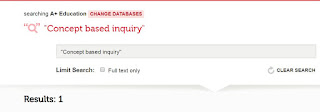Expert searching - Getting your bearings...
“The meaning of ‘knowing’ has shifted from being able to remember and repeat information to being able to find and use it.”
- National Research Council, 2007The internet is a daunting place in many respects. This post details my attempts to 'get my bearings' the expert searching maze. I admit to taking an (at times) rambling approach and, as though I was in a real maze, going back and forth between platforms and search engines a little, sometimes back-tracking when I found something worked in one and trying it out in another... This is necessarily a 'snapshot' of the process.
 |
| Photo by Maxwell Young on Unsplash |
Initial attempts - straight into the maze...
Having learnt about Boolean operators and searching long ago (and having forgotten about it in the intervening years), I decided to incorporate this into my search terms map because I thought it would be a more useful starting point than simply typing my inquiry question into Google... |
| Search Terms Map created with Lucidchart |
Googling - left turn...
- Even just the word 'effective' narrowed this significantly to 363 results
Tried a few different combinations of terms, sometimes with surprising results...
Key learning:
- successful use of Boolean operatives requires a clear idea of what you are looking for and terms the literature uses, or it can seem random or the results baffling. E.g. when I tried the combination of "inquiry learning" + MYP + "concept based", hoping that by identifying a key pedagogy and curriculum tool of the MYP I would get some more targeted results, I was disappointed. I got nothing particularly new or relevant… I was asking myself am I not using the right language? Or do teachers not equate the MYP concept-based learning with inquiry? Or is this assumed rather than stated?
Google Scholar - right turn...
- Tried this search again, but in Scholar: "inquiry learning" + MYP + "concept based" = much more manageable - 26 results!
Other search strings for Google Scholar and adaptations:
Inquiry + MYP
|
1500 or so results, then I selected ‘since 2019’ – 53
results, but very varied because of the broad search term.
|
Inquiry + MYP + “concept-based”
|
Only 8 results, not promising.
Decided to add ‘NOT PYP’ and remove “concept-based”.
This gave 29 results, but with
very skewed relevance…
|
Inquiry + “concept-based” + MYP NOT PYP
|
Broadened to from 2018
as well.
One very relevant and comprehensive analysis of the benefits of MYP for teaching and learning… but not much else.
|
I also tried "[inquiry OR enquiry]" + MYP in Google Scholar and was rewarded with a manageable number of resources and from here I could narrow further based on dates.
Key learning:
Key learning:
- Because the field is narrower with scholar, the searching can yield much more manageable searches.
- HOWEVER, often the articles had a narrow focus on a particular case study or subject OR were not especially helpful for practitioners in the implementation of effective inquiry.
Social Media - left turn...
A few key points about Twitter, with a compilation of search screen shots:
- "Inquiry MYP" searching led me to lots of relevant educational blogs.
- #inquiry #MYP - personal tweets from individual teachers, lots of photographs and individual reflection, rather than educational resources or articles.
- 'ALL of these: MYP inquiry concept-based' - very restricted search while 'ANY of these' was far too broad - all kinds of irrelevant articles.
- too many terms or too many combinations = unproductive, e.g. - the particular combination of ANY benefits 'inquiry learning' (concept-based OR MYP) NOT PYP resulted in 0 findings.
- ANY of 'effective inquiry learning' = more effective in getting articles, videos and blogs, quite controversial responses - the word 'effective' led to pieces critical of inquiry learning.
Key learning:
- While Twitter Advanced the search function helps to scaffold Boolean operatives fairly effectively, the platform ultimately behaves more unpredictably to google and databases - perhaps, at least in part, because of the ‘folkonomy’ nature of hashtags. Also little way of refining the types of content searched, so you inevitably get quite a lot of 'personal' content.
Databases - another right...
- Informit however, when I simplified a search to combine of inquiry and concept-based learning...
- Results narrowed so far as to be meaningless, and the more I tried to combine 'concept-based' and 'inquiry' into a phrase - even worse!
Key learning:
- Narrower field of databases and the more academic lens, means that many of the articles which appear were quite niche in their focus - not necessarily useful for practitioners. However, their were some studies about the effectiveness of inquiry.
Despite some frustrations, the fruits of my labour can be seen in the end results - my Inforgraphic, summarising my findings, and a curated collection of the most useful resources which will follow.











Wow Briana! This was easy to read, and made perfect sense. I'm in awe! The dot points and key learnings were really easy to follow - I can only guess it wasn't as easy living it.
ReplyDelete